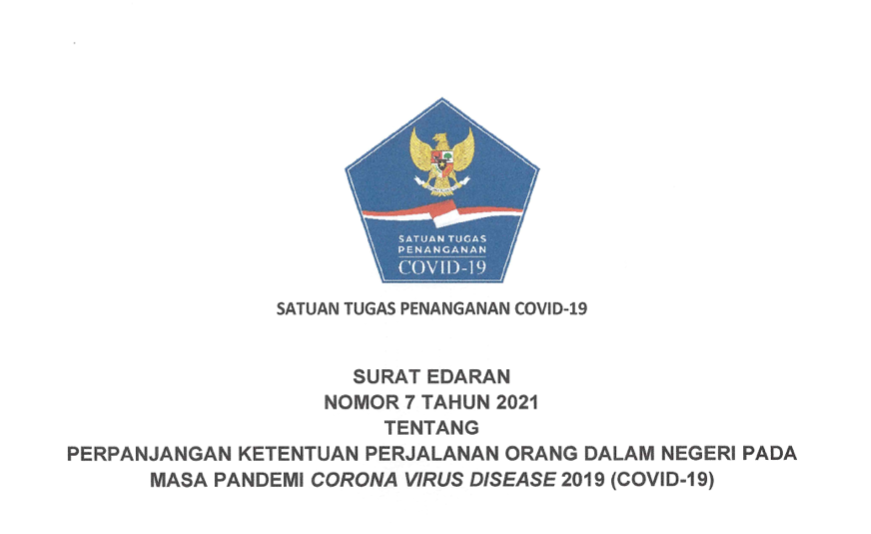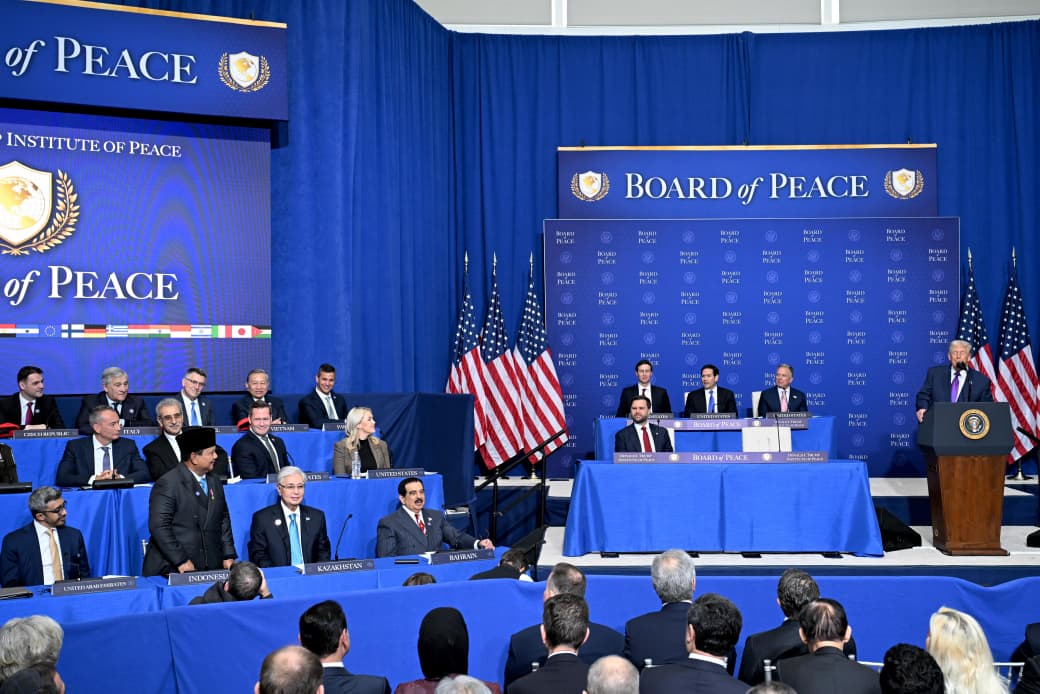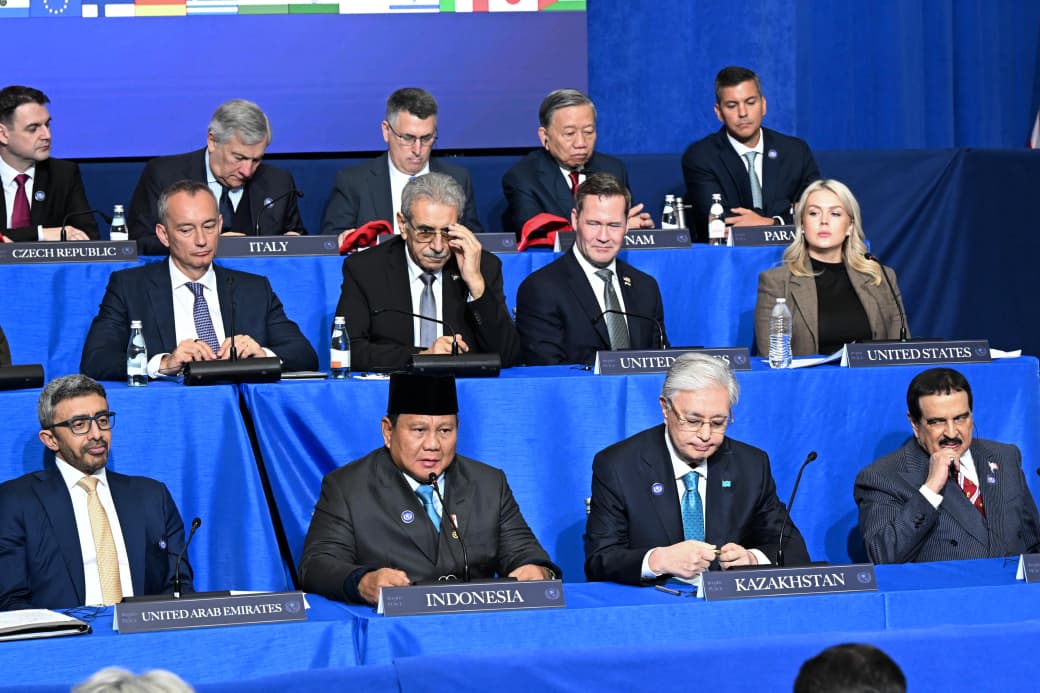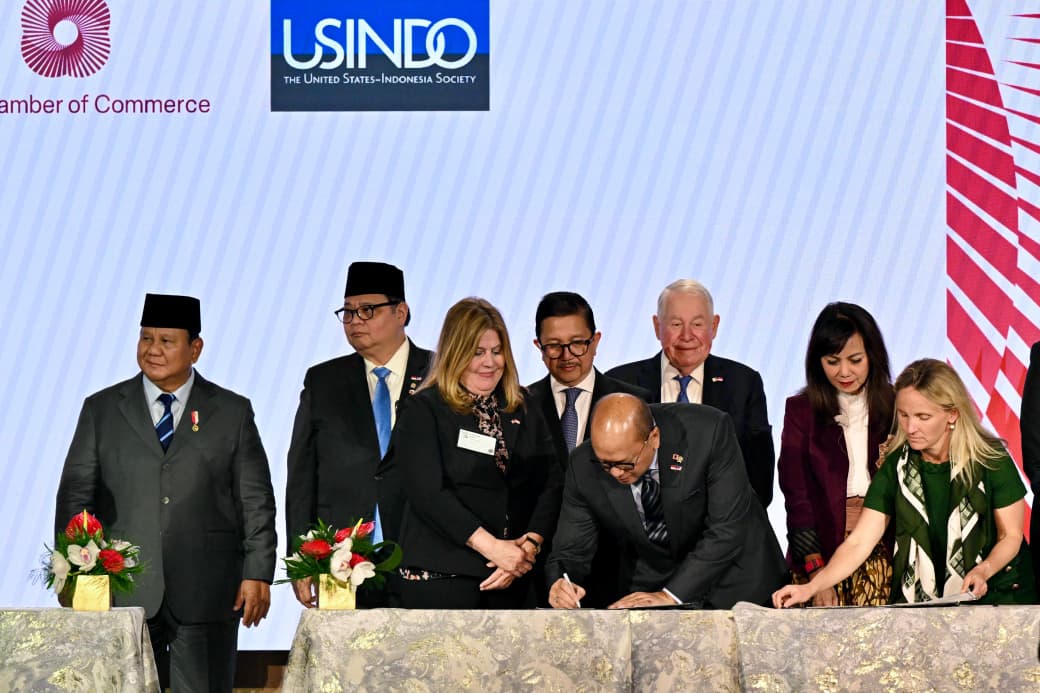COVID-19 Task Force Issues New Regulation for Domestic Travel during Pandemic

The COVID-19 Handling Task Force issued Circular Number 7 of 2021 on the Extension of Provisions for Domestic Travel during COVID-19 Pandemic.
“The scope of the Circular is health protocols for domestic traveler using all modes of transportation across Indonesia,” the Circular reads.
The Circular explains that domestic travel is the movement of people from one area to another based on provincial/regency/city administrative boundaries using private or public transportation modes either by land, railways, sea, rivers, lakes, ferry or air transport.
The provisions of the health protocols stipulated in the Circular are as follows.
- Every traveler must apply and comply with health protocols, namely: wearing a face mask, keeping a safe distance and avoiding crowds, and washing hands with soap or using a hand sanitizer.
- Enforcement of travel health protocols must be improved in the forms of:
- The face mask must properly cover the nose and mouth;
- The types of masks used by traveler are 3-layer cloth masks or medical masks;
- During the trip, it is prohibited to speak directly or by telephone on land, rail, sea, river, lake, ferry and air transportation modes;
- It is prohibited to eat and drink during the flight for a trip of less than 2 hours, with the exception of individuals who are required to take medication in the context of treatment that affects the safety and health of that person.
- Domestic traveler must follow the following protocols:
- Every individual who travels with a private or public vehicle is responsible for his/her own health, and is subject to the applicable terms and conditions;
- For travel to Bali, the following terms and conditions shall apply:
- A traveler using air transportation mode is required to show a certificate of a negative result of RT-PCR test taken within a maximum period of 2 x 24 hours before departure or negative results of the rapid antigen test taken within a maximum period of 1 x 24 hours before departure, and fill out Indonesia’s e-HAC; and
- A traveler using land or sea transportation, both private and public, is required to show a negative result of RT-PCR test or negative antigen rapid test, taken within a maximum period of 3 x 24 hours before departure, and fill out Indonesia’s e- HAC.
- For traveler from and to Java Island as well as within Java Island (between provinces/regencies/cities) the following terms and conditions shall apply:
- A traveler using land public transportation is subject to a random check, rapid antigen test/GeNose test if deemed necessary by the Regional COVID-19 Handling Task Force;
- Air traveler is required to show a certificate of a negative result of RT-PCR test taken within a maximum period of 3 x 24 hours or a negative result of the rapid antigen test taken within a maximum period of 2 x 24 hours before departure;
iii. Sea traveler must show a certificate of a negative result of RT-PCR test or a negative result of antigen rapid test taken within a maximum period of 3 x 24 hours before departure;
- Intercity train traveler must show a certificate of a negative result of RT-PCR test or a negative rapid antigen/GeNose test taken within a maximum period of 3 x 24 hours before departure;
- A traveler using private land transportation is advised to carry out RT-PCR tests or rapid antigen tests within a maximum period of 3 x 24 hours before departure;
- During long holidays or religious holidays, long-distance land traveler using train or private vehicles is subject to the following terms and conditions: 1) The traveler must conduct an RT-PCR test/rapid antigen test/GeNose test taken within 1 x 24 hours before departure; 2) Travel restriction and traffic management during a long holiday may be imposed for private vehicle at the Central and Regional levels; and 3) During the trip the traveler is obliged to adhere to strict health protocols stipulated;
vii. Leaders of Government Ministries/Institutions, the Indonesian National Defense Forces (TNI) and the Indonesian National Police (Polri), Regional Governments, and State-Owned Enterprises/ Regional-Owned Enterprises muss prohibit state apparatus/employees/personnel to travel during long holidays or religious holidays;
viii. Heads of private companies must urge employees to postpone travel during long holidays or religious holidays; and
- A traveler using all modes of public and private transportation is advised to fill out Indonesia’s e-HAC, while air and sea travelers are obliged to complete e-HAC Indonesia.
- Children under 5 years of age are not required to take the RT-PCR test/rapid antigen test/GeNose test;
- Routine trip travelers on the island of Java with sea transportation modes that aim to serve limited inter-island or inter-domestic port locations within an agglomeration area or by land transportation, both private and public, within an urban agglomeration area, are not required to show RT-PCR test results or rapid antigen tests. Random tests will be carried out if deemed necessary by the Regional COVID-19 Handling Task Force;
- For travel to other areas, the following terms and conditions shall apply:
- A traveler using land public transportation is subject to a random check, rapid antigen test/GeNose test if deemed necessary by the Regional COVID-19 Handling Task Force;
- Air traveler is required to show a certificate of a negative result of RT-PCR test taken within a maximum period of 3 x 24 hours or a negative result of the rapid antigen test taken within a maximum period of 2 x 24 hours before departure;
iii. Sea traveler must show a certificate of a negative result of RT-PCR test or a negative result of antigen rapid test taken within a maximum period of 3 x 24 hours before departure;
- Intercity train traveler must show a certificate of a negative result of RT-PCR test or a negative result of rapid antigen/GeNose test taken within a maximum period of 3 x 24 hours before departure;
- A traveler using private land transportation is advised to carry out RT-PCR test or rapid antigen test within a maximum period of 3 x 24 hours before departure; and
- During long holidays or religious holidays, long-distance land traveler using train or private vehicles is subject to the following terms and conditions: 1) The traveler must conduct an RT-PCR test/rapid antigen test/GeNose test taken within 1 x 24 hours before departure; 2) Travel restriction and traffic management during a long holiday may be imposed for private vehicle at the Central and Regional levels; and 3) During the trip the traveler is obliged to adhere to strict health protocols stipulated;
vii. Leaders of Government Ministries/Institutions, the Indonesian National Defense Forces (TNI) and the Indonesian National Police (Polri), Regional Governments, and State-Owned Enterprises/ Regional-Owned Enterprises muss prohibit state apparatus/employees/personnel to travel during long holidays or religious holidays;
viii. Heads of private companies must urge employees to postpone travel during long holidays or religious holidays; and
- A traveler using all modes of public and private transportation is advised to fill out Indonesia’s e-HAC, while air and sea travelers are obliged to complete Indonesia’s e-HAC.
- If the result of the RT PCR test/rapid test antigen/GeNose test of the traveler is negative but the traveler shows symptoms, the traveler may not continue the trip and is required to carry out RT-PCR diagnostic tests and conduct self-isolation during the waiting time for the results of the examination; and
- Government apparatuses who carry out functions related to land/sea/air/rail transportation follow up the Circular by issuing legal instruments with reference to the Circular and the prevailing laws and regulations.
- The provisions referred to in number 3 shall not apply to pioneer transportation modes including in border and underdeveloped areas.
- Government agencies or Regional Governments which will impose specific criteria and requirements related to traveler in their regions may follow up the Circular by issuing legal instruments that comply with and are not contradictory to this Circular.
- The Circular that regulates the criteria and special requirements as referred to in number 5 is an integral part of the Circular.
“This Circular shall come into force on 9 February and shall be evaluated every two weeks according to the latest developments on the ground. The results of the evaluation shall be submitted to Ministries/Agencies/ Regional Governments,” the Circular reads. (COVID-19 Handling Task Force/UN) (RI/MUR)







